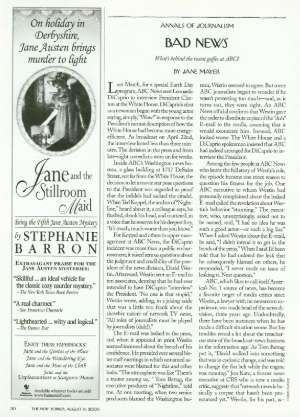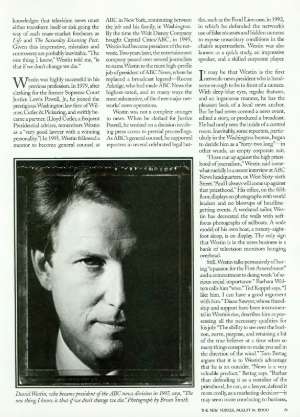The New Yorker, August 14, 2000 P. 30
ANNALS OF JOURNALISM about ABC News's president, David Westin... Mentions a scandal involving an interview Clinton gave ABC which was conducted by movie star Leonardo DiCaprio for Earth Day... As broadcast on April 22nd, the interview lasted less than three minutes. The derision in the press and from late-night comedians went on for weeks.Afterward, Westin sent an E-mail to ten associates, denying that he had ever intended to have DiCaprio “interview” the President.“No one is that stupid,” Westin wrote, adding, in a joking aside that was a little too frank about the showbiz nature of network TV news, “All roles of journalists must be played by journalists (duh!).” The E-mail was leaked to the press, and when it appeared in print Westin seemed incensed about the breach of his confidence... [S]ome ABC journalists began to wonder if he wasn’t protesting too much—and, as it turns out, they were right. An ABC News official confirms that Westin gave the order to distribute copies of the “duh” E-mail to the media, assuming that it would exonerate him. Instead, ABC looked worse. The White House and a DiCaprio spokesman insisted that ABC had indeed arranged for DiCaprio to interview the President... By the time the Walt Disney Company bought Capital Cities/ABC, in 1995, Westin had become president of the network. Two years later, the entertainment company passed over several journalists to name Westin to the more high-profile job of president of ABC News, where he replaced a broadcast legend—Roone Arledge, who had made ABC News the highest-rated, and in many ways the most substantive, of the three major networks’ news operations... But he had never covered a news event, edited a story, or produced a broadcast. He had rarely seen the inside of a control room. Inevitably, some reporters, particularly in the Washington bureau, began to deride him as a “forty-two long”—in other words, an empty corporate suit... Westin can take credit for some notable successes, including ABC’s coverage of the arrival of the millennium. Many, including Koppel, had opposed Westin’s Jules Verne approach of tracking midnight as it moved through all the world’s time zones. But Westin committed millions of dollars to the programming, and it won high ratings, critical praise, and a Peabody award. (It also won a private apology from Koppel.)... Tells about episodes of perceived self-censorship with regard to parent company Disney... Westin’s cultivation of the illustrious is frequently remarked upon. One well-known ABC personality says that Westin often mentioned flying to Washington to attend A-list dinners at the British Embassy, where he has become friendly with the Ambassador. At a dinner at Bradlee’s house, Westin gave a toast in which he talked about how he’d pressed his nose to the glass of such Georgetown gatherings, and couldn’t believe he was finally an honored guest. “It was completely cringe-making,” another of Bradlee’s guests told me. Westin’s toast was so fulsome toward Bradlee that it provoked a catcall from Bradlee’s wife, Sally Quinn, who pointed out that it was her party, too... number of those who have witnessed Westin’s rise at ABC suggest that a lot of credit goes to Sherrie Rollins Westin, his third wife, an attractive and socially ambitious public-relations executive... Sherrie Rollins Westin is the daughter of a vice-president of a construction- machinery company in Roanoke, Virginia. After graduating from the University of Virginia, she rose through a series of increasingly high-powered public-relations jobs, first in Washington, later in New York, accumulating along the way a legendary Rolodex and a reputation as a social dynamo. Flirtatious and fun-loving, she is famous for sending people—and even well-placed dogs—cards and presents for birthdays, anniversaries, andValentine’s Day. Her marriage to Ed Rollins seemed happy until his career was damaged by a series of miscalculations. In 1992, when Ed signed up with H. Ross Perot’s short-lived Presidential campaign, Sherrie, who occupied a senior post in the Bush White House, felt obliged to resign. ...Roone Arledge collected talent like an old-fashioned studio boss, but many of the stars in the news division can be, as Westin’s mother told me, a “big headache for David.” The widespread perception inside ABC News is that Westin has been less adept at handling them than his predecessor. As one former producer there puts it, “Diane’s got David over a barrel.” To be sure, Westin owes Sawyer a good deal for having helped to resuscitate “Good Morning America,” whose ratings had been in decline before she and Charles Gibson became co-anchors. But a former ABC executive says,“The rule about Diane Sawyer is that there are no rules when it comes to Diane Sawyer.”...Westin defends “20/20 Downtown” as being akin to one of his childhood favorites, “The Wild Kingdom,” because it takes viewers somewhere exotic. Yet he admits that “the biggest problem” with news “is incrementalism. It’s a slippery slope. You take one small step and end up someplace you don’t want to be.” In fact, the shift away from what is important in favor of what simply draws viewers seems to have affected news coverage at almost every level. Barbara Walters, for instance, complained to me that “no one cares about foreign policy. What are the big gets now—a murderer? Someone who is sick?”... Domestic politics is also getting less airtime. Westin says, almost defiantly, “We won’t cede politics to cable.” But ABC now devotes about half as much time to campaign coverage as it did eight years ago. It is limiting prime-time coverage of the major-party conventions to just an hour on the first three days and two hours on the final night. Westin says that ABC’s convention coverage, which as recently as 1980 occupied eight nights of programming, will emphasize “quality, not quantity.” Friedman, who as Westin’s top deputy handles most hard-news decisions, says, “I defy you to tell me why we should do more.”...


